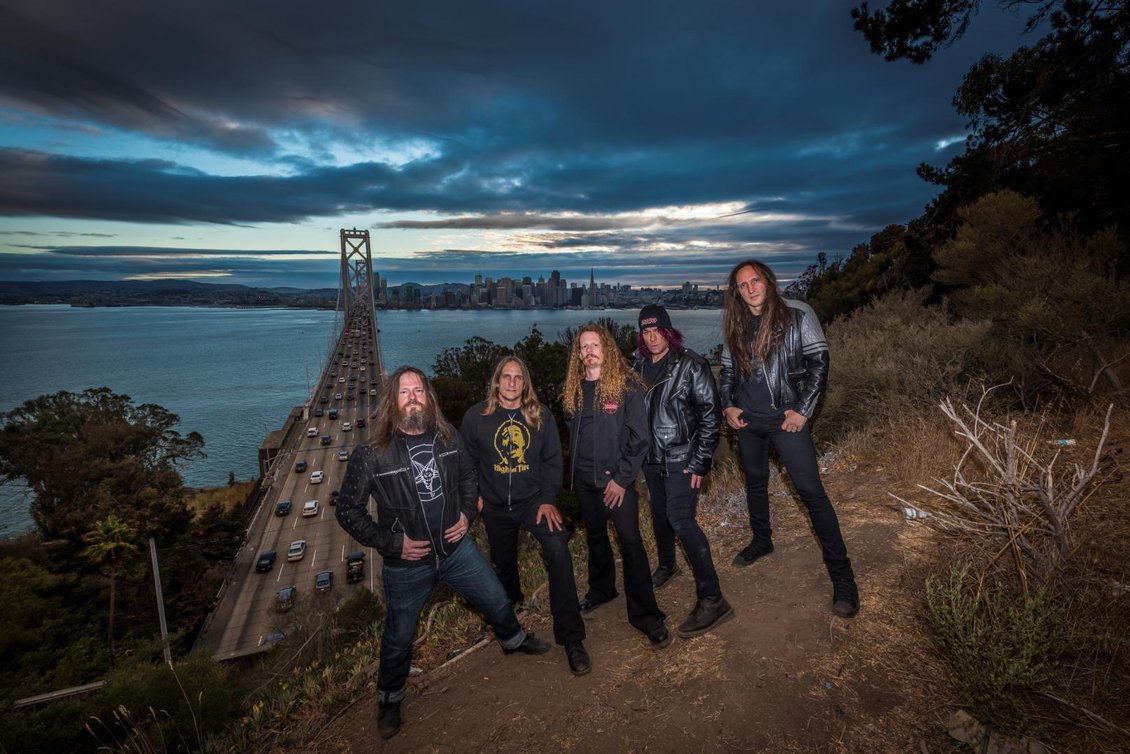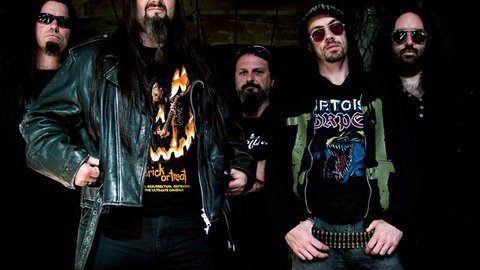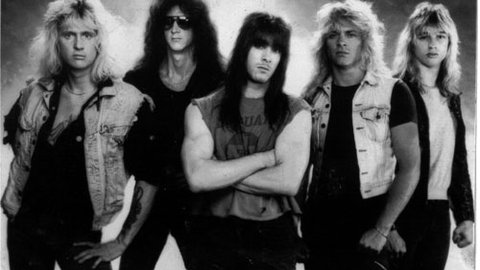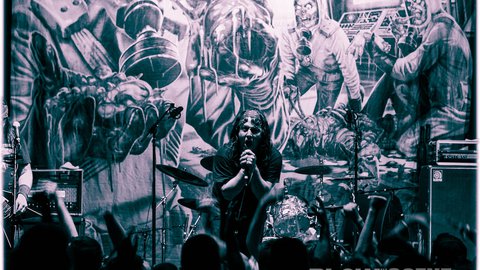Exodus
The original architects of the thrash metal scene, EXODUS has battled every kind of adversity over the past 30 years and used it all as fuel to stoke their ever-raging fire. Short-lived trends, line-up shifts, label conflicts, even the death of founding vocalist Paul Baloff couldn’t stop the beast. And through it all, guitarist and songwriter Gary Holt has persevered with misanthropic indignation, rolling with the punches, reassembling the broken pieces and working with the eccentric personalities surrounding him to create some of the most trenchant, fast-paced, and unrelenting music that influenced everyone from Pantera to Lamb of God and continues to crush skulls at a time decades after most ‘80s thrash bands have retired.
With Blood In Blood Out, EXODUS’ tenth full-length studio album of new material, Holt, Hunting, Gibson, Altus, and Souza prove they still has the fortitude, chops, and talent to deliver top-notch, ballad-free tunes that stand out without straying from their band’s core aesthetic. The title of the album encapsulates Holt’s approach to EXODUS: “When I was working on the record, I was sitting around watching TV series like ‘Gangland’ and all these locked-up prison reality shows,” he says. “And I thought, ‘Yeah, that’s like EXODUS.’ It’s a brotherhood. You bleed to get in, you bleed to get out. I’ve been doing this kind of music since I was a teenager and I’ll be doing it ‘til I can’t physically do it anymore.”
Holt has lost none of the rage and hunger he had in his teens and he’s long since mastered his craft. The eleven pulse-pounding tunes on Blood in Blood Out are among EXODUS’ best, signaling a rebirth as much as an evolution. Although Holt has spent the last few years playing second guitar for Slayer on tour, he has never forgotten where he came from and his priority and dedication to EXODUS. The evidence is written all over the album, which is rife with speed, fury and memorable riffs.
The title track storms out of the gate with chunky, rapid-fire guitars, hammering beats, and gang vocals on the chorus, not to mention the signature vocals of longtime EXODUS singer Steve “Zetro” Souza, who recently returned the band. “Salt the Wound” is slightly slower but equally fierce, with a contagious refrain that’s sure to be a future crowd shout-along as powerful as the one in the band’s classic “Bonded By Blood.” “Food For the Worms” is a six-plus-minute gem with a martial intro that segues into a speedy thrash section perfect for street brawls and headbanging alike. The rest of the song features slower mosh-worthy parts, immaculately crafted rhythmic changes, and searing guitar harmonies.
After the complex thematic series The Atrocity Exhibition: Exhibit A (2007) and Exhibit B: The Human Condition (2010) - which featured epic songs and riffs that morphed like cyborgs from the film Terminator Salvation - Blood in Blood Out is as easy to grasp as a machete with finger notches in the handle. “It was always my grand vision to do a two-part Rush/King Crimson epic of thrash metal, and we did it,” Holt proudly exclaims. “I kind of got that out of my system, so this time I wanted everything to sound more natural, shorter, and to the point. Get in and get out. So this one is a little more to the roots. Maybe some of that old Bonded By Blood influence came out and it’s heavy as fuck, but that’s the way we like it.”
Adding significantly to the tone and attitude of the album is Souza, who sang with EXODUS from 1986 to 1992, and again between 2002 and 2004. Souza replaced Rob Dukes, who left after nine years with the band. “It was the hardest thing this band has ever had to do in our lives,” Holt says. “It sucked to have to do it, but we were no longer on the same page on a lot of things. It needed to be done for the band to continue.”
Instead of working with unknown entities, EXODUS decided to ask Souza - who had already performed with the band on five albums - to come in and try out. EXODUS sent Souza two tracks: “Black 13” and “BTK,” both of which featured Holt’s guide vocals. “I got a call from management and they said, ‘Hey, the guys want you to sing a couple songs,’ says Souza. “They didn’t really get into why. I thought maybe they wanted me to guest on the album or do a tour. I came in and sang the songs and about three days later I got a call from management again saying, ‘The guys really like what you did on the songs and they’re considering bringing you back in the band again.’ I was like, ‘Wow, cool!’ I had a talk with each band member and we discussed a lot of things that happened in the past. But I’ve always felt like we’re a family. And families fight. The last time I was in the band, I wasn’t 100 percent. This time I was out for blood again.”
“What Zetro sang on those songs was killer,” Holt says. “It sounded like classic EXODUS. He did it with almost no preparation time. He had the lyrics in hand for two hours and the track in hand for about eight. And the next day he came in and sang it like he’d been singing it his whole life. So we felt really confident and we were psyched to have him back in the band.”
With Souza back behind the microphone, the only obstacle was time. Holt was traveling back and forth between Europe playing festival shows with Slayer (he’ll double-shift on the upcoming Slayer/EXODUS tour) and then coming back to the States to help finish the EXODUS album. Souza had just two weeks in the studio to record all of his vocals.
“I started in the studio with ‘BTK’ and ‘Black 13’ because I had sung those already. Then I went into the studio at about 11 a.m. and picked two songs. I took them home and studied them and then went in the next day and recorded them. Then I’d send them to Gary to get his comments. If he wanted anything changed it was usually minor. Then I’d pick two more songs and do the same thing again.”
Souza isn’t the only performer on Blood In Blood Out who had been out of the band for more than a decade. Original band guitarist Kirk Hammett (yes, of Metallica!) dropped by the studio to contribute a solo to “Salt the Wound.”
“Considering the amount of times I’ve played with Kirk over the past few years with the Slayer Big 4 shows, we’ve been in regular communication,” Holt says. “It was actually the first time he got to play on an official EXODUS release. He did the early demo, and then joined Metallica and didn’t do anything with us after that. So he was totally gung-ho about it. He came down and ripped out a bunch of takes and we picked the best one and then had a barbecue and drank beer.”
Another special guest on Blood In Blood Out is electronic music producer Dan the Automator (Gorillaz, Mike Patton, Deltron 3030), who crafted an industrial soundbed for the intro to the album opener, “Black 13.” The piece starts with a syncopated computerized beat, sirens and a repetitive metal riff before building through a marching drumbeat and wobbly synth sounds. When the electronics drop out and the charging meth-head riff and beat kick in, they sound heavier than a slab of granite. “My former manager manages Dan the Automator now,” Holt says, explaining the connection between the disparate artists. “We ran into each other a couple times. I knew what I wanted to hear and I knew he could do it, and could do it that day. So we sent him a file with the drums and guitars we already had there and just told him to go crazy with it.”
While much of Blood In Blood Out is filled with aggressive songs, hatred and violence, there were a few more specific subjects Holt wanted to address. “‘Numb’ was inspired by the non-stop televised barrage of death and destruction that’s on a 24-hour feed,” Holt says. “In the end, you’re numb to it and barely shocked by anything anymore, which is really sad.”
Even more political, “Collateral Damage” addresses the monolithic power of big business and how a few top executives have gained control over most of the wealth of America. “It has gotten to the points where we’re just peons in a government machine,” Holt says. “We’re just society. We have no say. We’re just there to be swept aside. But at least we can make a lot of noise about it.”
With the return of Souza, a renewed focus on writing tight, infectious songs and a commitment to remaining insanely heavy EXODUS are primed to help make the thrash nation as strong as it was in the mid-‘80s. Whether charging like an endorphin-fueled army or chugging at half-speed (a technique EXODUS perfected 20 years before the birth of the metalcore “breakdown”), Blood In Blood Out is a showcase of steely determination, unparalleled skill, and unrefined rage.
“Back in the early days, I was like: ‘Stand in the way and you’ll get steamrolled over by EXODUS!’” Souza says. “It’s that way again. Don’t stand in the way of this. You will get run over! I guarantee it.”
With Blood In Blood Out, EXODUS’ tenth full-length studio album of new material, Holt, Hunting, Gibson, Altus, and Souza prove they still has the fortitude, chops, and talent to deliver top-notch, ballad-free tunes that stand out without straying from their band’s core aesthetic. The title of the album encapsulates Holt’s approach to EXODUS: “When I was working on the record, I was sitting around watching TV series like ‘Gangland’ and all these locked-up prison reality shows,” he says. “And I thought, ‘Yeah, that’s like EXODUS.’ It’s a brotherhood. You bleed to get in, you bleed to get out. I’ve been doing this kind of music since I was a teenager and I’ll be doing it ‘til I can’t physically do it anymore.”
Holt has lost none of the rage and hunger he had in his teens and he’s long since mastered his craft. The eleven pulse-pounding tunes on Blood in Blood Out are among EXODUS’ best, signaling a rebirth as much as an evolution. Although Holt has spent the last few years playing second guitar for Slayer on tour, he has never forgotten where he came from and his priority and dedication to EXODUS. The evidence is written all over the album, which is rife with speed, fury and memorable riffs.
The title track storms out of the gate with chunky, rapid-fire guitars, hammering beats, and gang vocals on the chorus, not to mention the signature vocals of longtime EXODUS singer Steve “Zetro” Souza, who recently returned the band. “Salt the Wound” is slightly slower but equally fierce, with a contagious refrain that’s sure to be a future crowd shout-along as powerful as the one in the band’s classic “Bonded By Blood.” “Food For the Worms” is a six-plus-minute gem with a martial intro that segues into a speedy thrash section perfect for street brawls and headbanging alike. The rest of the song features slower mosh-worthy parts, immaculately crafted rhythmic changes, and searing guitar harmonies.
After the complex thematic series The Atrocity Exhibition: Exhibit A (2007) and Exhibit B: The Human Condition (2010) - which featured epic songs and riffs that morphed like cyborgs from the film Terminator Salvation - Blood in Blood Out is as easy to grasp as a machete with finger notches in the handle. “It was always my grand vision to do a two-part Rush/King Crimson epic of thrash metal, and we did it,” Holt proudly exclaims. “I kind of got that out of my system, so this time I wanted everything to sound more natural, shorter, and to the point. Get in and get out. So this one is a little more to the roots. Maybe some of that old Bonded By Blood influence came out and it’s heavy as fuck, but that’s the way we like it.”
Adding significantly to the tone and attitude of the album is Souza, who sang with EXODUS from 1986 to 1992, and again between 2002 and 2004. Souza replaced Rob Dukes, who left after nine years with the band. “It was the hardest thing this band has ever had to do in our lives,” Holt says. “It sucked to have to do it, but we were no longer on the same page on a lot of things. It needed to be done for the band to continue.”
Instead of working with unknown entities, EXODUS decided to ask Souza - who had already performed with the band on five albums - to come in and try out. EXODUS sent Souza two tracks: “Black 13” and “BTK,” both of which featured Holt’s guide vocals. “I got a call from management and they said, ‘Hey, the guys want you to sing a couple songs,’ says Souza. “They didn’t really get into why. I thought maybe they wanted me to guest on the album or do a tour. I came in and sang the songs and about three days later I got a call from management again saying, ‘The guys really like what you did on the songs and they’re considering bringing you back in the band again.’ I was like, ‘Wow, cool!’ I had a talk with each band member and we discussed a lot of things that happened in the past. But I’ve always felt like we’re a family. And families fight. The last time I was in the band, I wasn’t 100 percent. This time I was out for blood again.”
“What Zetro sang on those songs was killer,” Holt says. “It sounded like classic EXODUS. He did it with almost no preparation time. He had the lyrics in hand for two hours and the track in hand for about eight. And the next day he came in and sang it like he’d been singing it his whole life. So we felt really confident and we were psyched to have him back in the band.”
With Souza back behind the microphone, the only obstacle was time. Holt was traveling back and forth between Europe playing festival shows with Slayer (he’ll double-shift on the upcoming Slayer/EXODUS tour) and then coming back to the States to help finish the EXODUS album. Souza had just two weeks in the studio to record all of his vocals.
“I started in the studio with ‘BTK’ and ‘Black 13’ because I had sung those already. Then I went into the studio at about 11 a.m. and picked two songs. I took them home and studied them and then went in the next day and recorded them. Then I’d send them to Gary to get his comments. If he wanted anything changed it was usually minor. Then I’d pick two more songs and do the same thing again.”
Souza isn’t the only performer on Blood In Blood Out who had been out of the band for more than a decade. Original band guitarist Kirk Hammett (yes, of Metallica!) dropped by the studio to contribute a solo to “Salt the Wound.”
“Considering the amount of times I’ve played with Kirk over the past few years with the Slayer Big 4 shows, we’ve been in regular communication,” Holt says. “It was actually the first time he got to play on an official EXODUS release. He did the early demo, and then joined Metallica and didn’t do anything with us after that. So he was totally gung-ho about it. He came down and ripped out a bunch of takes and we picked the best one and then had a barbecue and drank beer.”
Another special guest on Blood In Blood Out is electronic music producer Dan the Automator (Gorillaz, Mike Patton, Deltron 3030), who crafted an industrial soundbed for the intro to the album opener, “Black 13.” The piece starts with a syncopated computerized beat, sirens and a repetitive metal riff before building through a marching drumbeat and wobbly synth sounds. When the electronics drop out and the charging meth-head riff and beat kick in, they sound heavier than a slab of granite. “My former manager manages Dan the Automator now,” Holt says, explaining the connection between the disparate artists. “We ran into each other a couple times. I knew what I wanted to hear and I knew he could do it, and could do it that day. So we sent him a file with the drums and guitars we already had there and just told him to go crazy with it.”
While much of Blood In Blood Out is filled with aggressive songs, hatred and violence, there were a few more specific subjects Holt wanted to address. “‘Numb’ was inspired by the non-stop televised barrage of death and destruction that’s on a 24-hour feed,” Holt says. “In the end, you’re numb to it and barely shocked by anything anymore, which is really sad.”
Even more political, “Collateral Damage” addresses the monolithic power of big business and how a few top executives have gained control over most of the wealth of America. “It has gotten to the points where we’re just peons in a government machine,” Holt says. “We’re just society. We have no say. We’re just there to be swept aside. But at least we can make a lot of noise about it.”
With the return of Souza, a renewed focus on writing tight, infectious songs and a commitment to remaining insanely heavy EXODUS are primed to help make the thrash nation as strong as it was in the mid-‘80s. Whether charging like an endorphin-fueled army or chugging at half-speed (a technique EXODUS perfected 20 years before the birth of the metalcore “breakdown”), Blood In Blood Out is a showcase of steely determination, unparalleled skill, and unrefined rage.
“Back in the early days, I was like: ‘Stand in the way and you’ll get steamrolled over by EXODUS!’” Souza says. “It’s that way again. Don’t stand in the way of this. You will get run over! I guarantee it.”




